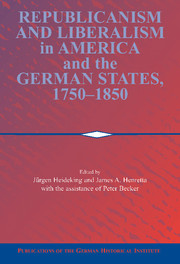Book contents
- Frontmatter
- Introduction
- PART I OVERVIEW
- PART II THE REPUBLICAN WORLD
- 2 The Concept of the Republic in Eighteenth-Century German Thought
- 3 Kant’s Republicanism and Its Echoes
- 4 Constitutions, Charity, and Liberalism by Default: Germany and the Anglo-American Tradition
- 5 Politics and Sentiment: Catharine Macaulay’s Republicanism
- 6 Between Liberalism and Republicanism: “Manners” in the Political Thought of Mercy Otis Warren
- PART III THE TRANSITION FROM REPUBLICANISM TO LIBERALISM
- PART IV THE LOGIC OF LIBERALISM
- Index
5 - Politics and Sentiment: Catharine Macaulay’s Republicanism
Published online by Cambridge University Press: 05 January 2013
- Frontmatter
- Introduction
- PART I OVERVIEW
- PART II THE REPUBLICAN WORLD
- 2 The Concept of the Republic in Eighteenth-Century German Thought
- 3 Kant’s Republicanism and Its Echoes
- 4 Constitutions, Charity, and Liberalism by Default: Germany and the Anglo-American Tradition
- 5 Politics and Sentiment: Catharine Macaulay’s Republicanism
- 6 Between Liberalism and Republicanism: “Manners” in the Political Thought of Mercy Otis Warren
- PART III THE TRANSITION FROM REPUBLICANISM TO LIBERALISM
- PART IV THE LOGIC OF LIBERALISM
- Index
Summary
The identification of a woman's name with republicanism is rather unusual. After all, the traditional values of civic humanism were “manly”; martial valor and participation in national politics, for instance, were obviously not something for a woman in the eighteenth century. Moreover, political philosophy at that time was almost exclusively written by male authors. Nonetheless, Catharine Macaulay left her mark on the eighteenth century as a political thinker and pamphleteer, and even managed to become famous as a “female patriot” in both England and America. In the late eighteenth century, American political thought was steeped in British republicanism, and Macaulay herself knew quite a number of American politicians who thought highly of her work and were grateful for her support of the American cause during the War of Independence. Her eight-volume History of England, which was available in many libraries in Great Britain and in the colonies, was praised by politicians like William Pitt and John Adams; George Washington made special preparations when the “celebrated historian” Macaulay paid him a two-week visit at Mount Vernon, and Thomas Jefferson recommended her work as an antidote to that “poison” David Hume's history had injected into the minds of the British people. In addition, Macaulay's political pamphlets were taken seriously by her opponents.
- Type
- Chapter
- Information
- Publisher: Cambridge University PressPrint publication year: 2002

